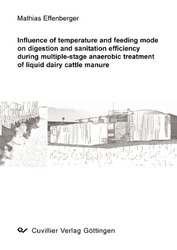| Departments | |
|---|---|
| Book Series (96) |
1381
|
| Nachhaltigkeit |
3
|
| Gesundheitswesen |
1
|
| Humanities |
2370
|
| Natural Sciences |
5408
|
| Mathematics | 229 |
| Informatics | 319 |
| Physics | 980 |
| Chemistry | 1364 |
| Geosciences | 131 |
| Human medicine | 243 |
| Stomatology | 10 |
| Veterinary medicine | 108 |
| Pharmacy | 147 |
| Biology | 835 |
| Biochemistry, molecular biology, gene technology | 121 |
| Biophysics | 25 |
| Domestic and nutritional science | 45 |
| Agricultural science | 1005 |
| Forest science | 201 |
| Horticultural science | 20 |
| Environmental research, ecology and landscape conservation | 148 |
| Engineering |
1795
|
| Common |
98
|
|
Leitlinien Unfallchirurgie
5. Auflage bestellen |
|
Advanced Search
Influence of temperature and feeding mode on digestion and sanitation efficiency during multiple-stage anaerobic treatment of liquid dairy cattle manure (English shop)
Mathias Effenberger (Author)Preview
Table of Contents, Datei (34 KB)
Extract, Datei (71 KB)
This work deals with the evaluation of the performance of a multiple-stage anaerobic digestion process with respect to the degradation of organic matter and the inactivation of pathogenic and indicator organisms in liquid dairy cattle manure. Investigations were performed at bench- and full-scale.
During the three-stage mesophilic-thermophilic-mesophilic anaerobic treatment of liquid manure from cattle receiving a high-fiber diet, a comparably high methane yield of 0.24 m3 per kg of volatile solids was achieved. Given a minimum guaranteed retention time of 4 h at 55°C, the level of fecal coliforms in liquid manure was reduced to below 10 MPN per g fresh matter. The concentration of infectious oocysts of Cryptosporidium parvum was reduced by more than 5 log-units. Increasing the feeding interval from 1 to 4 h had no significant influence on the performance of the system. When the temperature in the first treatment stage was decreased from 38 to 20-25°C, the process stability in the thermophilic reactor was significantly improved while overall the methane yield and the reduction of indicator organisms remained essentially unchanged.
Based on these findings, two-stage thermophilic-mesophilic anaerobic digestion can be approved as a treatment technology for liquid manure to minimize the input of pathogenic and indicator organisms from livestock farming into the environment.
| ISBN-13 (Printausgabe) | 3867276528 |
| ISBN-13 (Hard Copy) | 9783867276528 |
| ISBN-13 (eBook) | 9783736926523 |
| Final Book Format | A5 |
| Language | English |
| Page Number | 144 |
| Lamination of Cover | glossy |
| Edition | 1 |
| Volume | 0 |
| Publication Place | Göttingen |
| Place of Dissertation | München |
| Publication Date | 2008-07-25 |
| General Categorization | Dissertation |
| Departments |
Agricultural science
|
| Keywords | Anaerobic digestion; biogas; liquid manure; dairy cattle; pathogens; indicator organisms; mesophilic; thermophilic; cryptosporidia |








